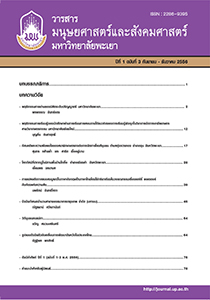วิถีชุมชนคนแม่กา
Keywords:
วิถีชุมชน, แม่กา, Ways of Life, Mae KaAbstract
การศึกษาเรื่อง “วิถีชุมชนคนแม่กา” มีวัตถุประสงค์สำคัญเพื่อศึกษาบริบททางเศรษฐกิจสังคม สิ่งแวดล้อม การเมือง ภูมิปัญญาของชุมชน รวมทั้งปัญหาของชุมชนตำบลแม่กา อำเภอเมือง จังหวัดพะเยา โดยใช้วิธีการศึกษาแบบผสมผสานโดยเก็บข้อมูลเชิงปริมาณ จากกลุ่มตัวอย่าง 18 หมู่บ้านในตำบลแม่กา จำนวน 782 คน ด้วยการสัมภาษณ์เจาะลึกปราชญ์ภูมิปัญญาของชุมชน 13 คน และการสังเกตในชุมชนประกอบกัน ผลการศึกษาพบว่า ด้านเศรษฐกิจกลุ่มตัวอย่างในชุมชนมีความเข้มแข็งทางเศรษฐกิจเป็นอย่างดี ด้านสุขอนามัย กลุ่มตัวอย่างส่วนใหญ่เป็นผู้มีสุขภาพดี และเอาใจใส่ดูแลสุขภาพทั้งตนเองและคนในครอบครัว ด้านสิ่งแวดล้อม มีการใช้สารเคมีในการทำการเกษตร เกษตรกรบางกลุ่มเห็นว่าสภาพดินเสื่อมลงกว่าปีที่ผ่านมา การจัดการขยะบางส่วนยังใช้วิธีการเผา ซึ่งก่อให้เกิดหมอกควัน ปริมาณน้ำอุปโภคบริโภคไม่เพียงพอ และยังขาดแคลนน้ำเพื่อการเกษตร ด้านการเมืองการปกครอง กลุ่มตัวอย่างได้เข้าไปมีส่วนร่วมในรูปสมาชิกกลุ่มต่าง ๆ และเข้าร่วมตัดสินใจในการพัฒนาชุมชน เพียงร้อยละ50 มีการรับรู้เกี่ยวกับการเลือกตั้งสมาชิกสภาผู้แทนราษฎร และสมาชิกองค์กรท้องถิ่นเป็นอย่างดี อย่างไรก็ตามกลุ่มตัวอย่างที่ไม่ทราบถึงผลการไม่ไปใช้สิทธิเลือกตั้ง มีมากถึงร้อยละ 30.4 ซึ่งจะต้องรณรงค์ให้กลุ่มที่ไม่ทราบได้เข้าใจสิทธิ และใช้สิทธิอย่างถูกต้อง เพื่อจะไม่เสียสิทธิทางการเมือง ปัญหาของชุมชนได้แก่ ขาดแคลนน้ำอุปโภคบริโภค การบุกรุกพื้นที่ป่า การจัดการขยะ หมอกควันจากการเผาขยะและไฟป่า การสูญเสียวัฒนธรรมและภูมิปัญญาท้องถิ่น อันเป็นผลจากการอพยพเข้ามาตั้งถิ่นฐานของคนจากหลายพื้นที่ นอกจากนั้นความเข้มแข็งของชุมชนยังลดลงอีกด้วย มหาวิทยาลัยพะเยาจึงควรนำเอาผลการศึกษาไปใช้ในการวางแผนส่งเสริมการบริการวิชาการ และทำนุบำรุงศิลปวัฒนธรรม ที่ตรงตามความต้องการของชุมชนต่อไป
Mae Ka People’s Ways of Life
Kwan Sanguansermsri
Section of Social Development, School of Liberal Arts, University of Phayao
The purpose of the study entitled “Mae Ka People’s Ways of Life” aimed toexplore the community’s economic, social, environmental, political, and local wisdom contextswas well as the community’s problems in Mea Ka Sub-district, Muang District, Phayao Province. For the data collection, mixed methods of quantitative research were conducted with782 villagers dwelling in 18 villages in Mae Ka Sub-district and the in-depth interview was also conducted with 13 local wisdom experts. The findings of the study revealed that in economic aspect, the community empowerment of participants in the communities was very strong. In health aspect, most of the samples had a good health and they took a very good care of themselves and their members in the family. In environmental aspect, the people still used chemicals in farming caused the low quality of soil, the burning of waste caused smog, and the shortage of water supply supported for the public utilities and agriculture. In term of politics, the subjects did not participate in the community to make a decision for the development of their villages, 50% of the participants were interested in the election of the House of the Representatives, and 30.4% of the participants did not know, so the campaign should be informed to the people correctly. In term of problems in Mae Ka community, the shortage of water supply supported for their people’s publicutilities, deforestation, waste management, smog caused by burning, the lost of local wisdom, the migration of people from other places, the decreases of community empowerment. Therefore, the University of Phayao can apply the results of this study to provide the academic services and maintenance of local wisdom to serve the needs of the community
Downloads
How to Cite
Issue
Section
License
ผู้นิพนธ์ต้องรับผิดชอบข้อความในบทนิพนธ์ของตน มหาวิทยาลัยพะเยาไม่จำเป็นต้องเห็นด้วยกับบทความที่ตีพิมพ์เสมอไป ผู้สนใจสามารถคัดลอก และนำไปใช้ได้ แต่จะต้องขออนุมัติเจ้าของ และได้รับการอนุมัติเป็นลายลักษณ์อักษรก่อน พร้อมกับมีการอ้างอิงและกล่าวคำขอบคุณให้ถูกต้องด้วย
The authors are themselves responsible for their contents. Signed articles may not always reflect the opinion of University of Phayao. The articles can be reproduced and reprinted, provided that permission is given by the authors and acknowledgement must be given.








